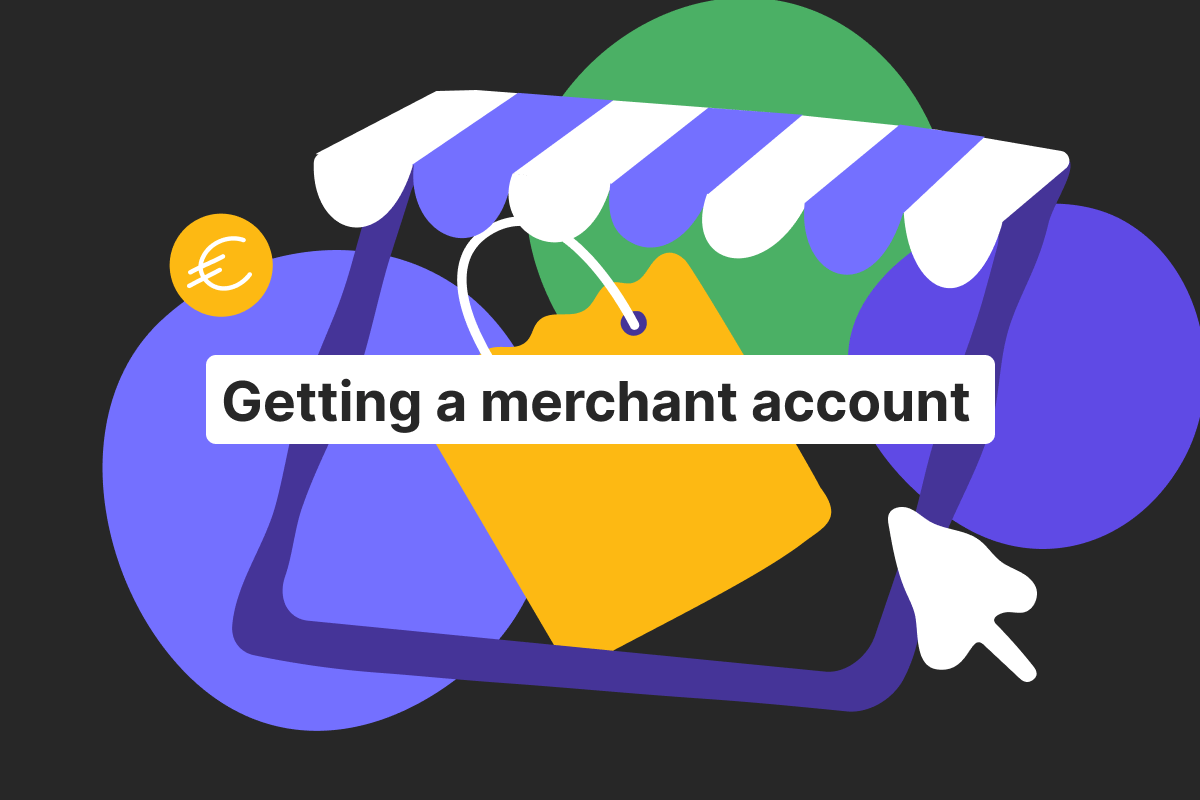If you run an online business, a merchant account is a very useful tool that lets you accept payments from a single credit card, multiple debit cards, or other types of electronic payments, separating it from your main business bank account.
So, if any business owner were to ask us, “How hard is it to get a merchant account?”
The short answer: it sadly depends on different things. Many, if not most, providers share a no-high-risk business policy; others charge additional fees because of the risk profile and high-risk industry in which the business operates.
In this step-by-step guide, we aim to provide an overview of what a merchant account entails, explain why some applications are more challenging than others, outline common requirements, specify the necessary business documentation, describe the underwriting process, and offer practical steps based on our experience.
What is a merchant account, and why do you need one?
So, what is a merchant account? A merchant account is a special type of business bank account (technically, a contract with an acquiring bank or merchant services provider) that allows a business to accept credit or debit cards and process customer payments.
For example, when a customer makes a transaction using a credit card, the funds flow from the card network and issuer through a payment processor and into the merchant account before settling into your business account.
Today, it is an industry standard, and the general rule is: if you want to accept payments, mobile payments, or other payment options on a checkout page, you need a merchant account or a payment setup that provides equivalent routing.
Why do you need a merchant account? That’s simple. Besides accepting credit card payments, debit cards, or other payment types like Apple Pay, a merchant account dramatically increases conversion for any online business and improves customer experience.
Without a merchant account or a payment gateway tied to one, a business would turn into a nightmare. Technically, you can use your business bank account to accept payments, but most providers would soon freeze your account because of an illegible cash flow – a business account is multipurpose: taxes, expenses, payouts, while a merchant account is solely made for payment processing with clients.
You can easily see the difference with Genome, as we have dedicated merchant services and business services that exist separately, offering different features for various purposes.
Open an account
in Genome online
Why getting a merchant account can be hard
It is due to a combination of strict regulations and different policies by each merchant account provider. The most common reasons why getting a merchant account can be difficult include:
Banks and financial institutions require strict checks. They must confirm your identity, ownership, and payment information before opening a merchant account.
Risk classification. Any merchant account provider categorizes businesses as high-risk or low-risk; high-risk businesses face a tighter underwriting process, or can even be labeled as no-go.
Compliance with KYC/AML. A key part of the merchant account application is the most challenging aspect, as businesses must provide specific documents multiple times, and the evaluation process is time-consuming.
Chargeback and fraud concerns. It is a high-risk merchant-related issue, leading to higher transaction fees or additional fees, and often serves as a strict red flag for a regular merchant account provider.
Processing history or future sales volume uncertainty.
Cross-border models. E-commerce or other businesses operating internationally need detailed business documentation.
Poor website or checkout setup. A missing refund policy or incomplete terms on the checkout page is usually considered a red flag.
Opening a merchant account is challenging because providers require not only good hardware but also strict regulations to process credit and debit card payments, making them somewhat selective.
Alternatively, you can select from our list of what we consider the best merchant account service providers this year.
Pricing and fees – what to consider
Merchant account services are a specialized payment processing business that requires a large hardware infrastructure and top software engineers to handle even basic payment processor functions.
Besides growing demand, that’s why there are many providers on the market – many of them, by default, have their own niche even if it isn’t clear.
You might notice above-average fees or high limits for card payments if they don’t fit the provider: any debit card payments, specific cross-border credit card payments, or a limit to card payments from clients under certain circumstances.
Reluctance to work with high-risk merchants is also an indicator – not a source of pride, but rather a challenge due to the high risk and difficulty in handling such businesses without specific infrastructure. Additionally, their partners, such as acquiring banks, cannot accommodate such a business model.
But do not fear opening a merchant account. Just before signing up with a merchant account provider, look closely at their pricing model:
Transaction fees and interchange rates – check for both.
Monthly maintenance fee and setup process costs.
Processing costs per transaction and any additional fees.
Chargeback and refund fees, particularly their chargeback limits, cannot be included in pricing; however, it is essential for you to be aware of them.
Rolling reserves for high-risk merchants.
Different fees apply for credit or debit cards compared to mobile payments.
Set up fees for the first merchant account application.
Always ask your provider for a transparent breakdown of processing costs, interchange rates, and any setup fees before signing. A payment processor is a business; try to understand what makes them money and how your merchant accounts work.
Common requirements for a merchant account approval
Every merchant account provider or merchant services provider needs specific documents before approving your merchant account application. Typical requirements include:
Business registration and licenses. Proof your company is legal – e.g., certificate of incorporation or business license.
Processing history or projections. Previous bank statements, expected sales volume or cash flow data, and accounting balance sheets would also work. A good credit history would also improve the process.
Valid ID and proof of address. Driver’s license, passport, or national ID for the business owner.
Business bank account or bank account details for settlements.
Website with clear refund/terms and a visible checkout page. A clean, secure site helps with PCI compliance.
Employer identification number (EIN) or tax ID if applicable.
Having all these ready speeds up the merchant account underwriting process and reduces back-and-forth with your provider.
Practical tips to speed approval and implementation
To make opening a merchant account faster and easier:
Prepare business documentation, business license, and bank statements before the application process. For a sole proprietorship or small business, prepare full ID and driver’s license copies. Just trust us, it is almost half of the deal.
Keep your checkout page professional – visible terms, refund policy, and PCI compliance matter.
Maintain good cash flow and a clean credit history, or make a clear business start date if you are a startup.
Respond quickly to requests during the merchant account underwriting process.
Be transparent with your payment processing and sales volume. Do not underestimate numbers; payment providers need them to balance hardware capabilities and set up a payment gateway.
If you’re high risk, choose a merchant services provider experienced with your niche.
Approval for a merchant account isn’t instant – after underwriting, your acquirer/PSP may approve, deny, or impose conditions (e.g., reserves or caps). Depending on your provider and region, a reseller/agent (often called an ISO in the U.S.) can assist with onboarding and integration, but the acquirer/PSP performs the actual risk approval and controls the account terms.
What qualifies some businesses as “high-risk”?
Some industries and business types are automatically seen as high-risk by acquiring banks. It affects the merchant account provider’s pricing, setup fees, and sometimes approval chances.
You might be categorized as high risk if:
You work in industries with frequent chargebacks, such as gambling, subscriptions, adult entertainment, or digital goods. (To clarify: for example, e-commerce is not a high-risk by default, but an online store with huge chargeback rates would be considered as such; on the other hand, an online casino is always considered high-risk due to its nature.)
You’re an online business without prior experience in processing transactions.
You have inconsistent sales volume or a limited credit history.
Your products or payment type creates fulfillment risk.
Being high-risk doesn’t mean automatic rejection, but some acquiring banks indeed don’t want to work with you. In other cases, you might pay higher transaction fees in order to accept credit cards, need a rolling reserve, or face longer application process timelines.
Open an account
in Genome online
How long does it take to get approved for a merchant account?
Approval time varies. Opening a merchant account can take anywhere from a few days to several weeks, depending on your merchant account provider and the underwriting process. Some providers even have a “fast-onboarding service” for additional setup fees.
Merchant application (1–3 days). Submit specific documents, such as your business license, website, and ID.
Verification (2–10 days). They review bank statements, balance sheets, credit history, and compliance.
Underwriting process (a few days to weeks). The acquiring bank reviews your model, sales volume, and cash flow.
Integration. Connect to payment gateways, test payment processing, and validate the ability to accept online payments from credit or debit cards.
Live processing. The provider monitors transaction fees, processing costs, and chargebacks.
Delays typically occur due to missing documentation, mismatched bank account data, unresolved compliance flags during the merchant account underwriting process, or an excessive volume of applications at the time.
How Genome simplifies the process
Our team made some upgrades to make getting a merchant account much easier through automation and transparent merchant services. Here’s how:
Quick online application – submit your merchant application digitally.
Compliance-first approach �– by focusing on it first, we can help the potential client address the issue directly, saving time that would be spent on less critical questions.
Our merchant account services are tailored for e-commerce and international businesses.
We offer multi-currency accounts, dedicated IBANs, integrated business bank account features, and risk management tools.
Transparent pricing model with clear fee policies explained upfront.
An all-in-one merchant account provider and business account platform combination is perfect for small businesses and large corporations alike.
Genome’s platform started an exclusive merchant account BETA testing that allows businesses to accept payments via Open Banking instantly with the help of SEPA Instant Transfers, and manage other payment methods all in one dashboard.
Unlock even more services with batch transfers, instant notifications for C2B payments, virtual and physical Visa debit cards, and more.






